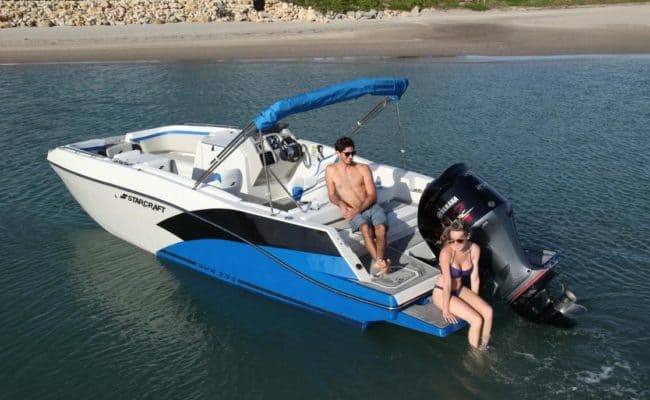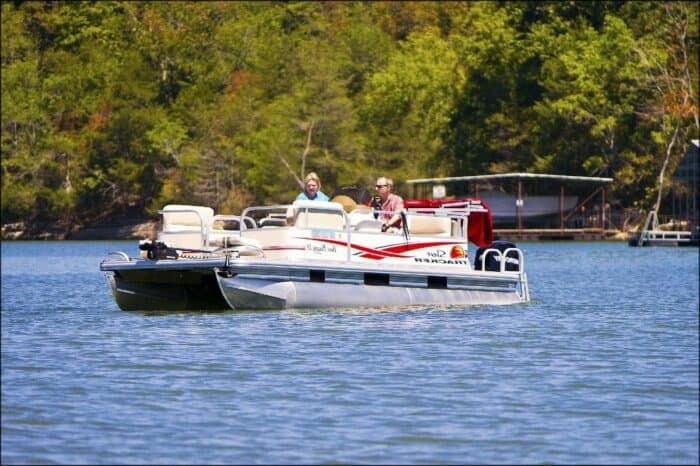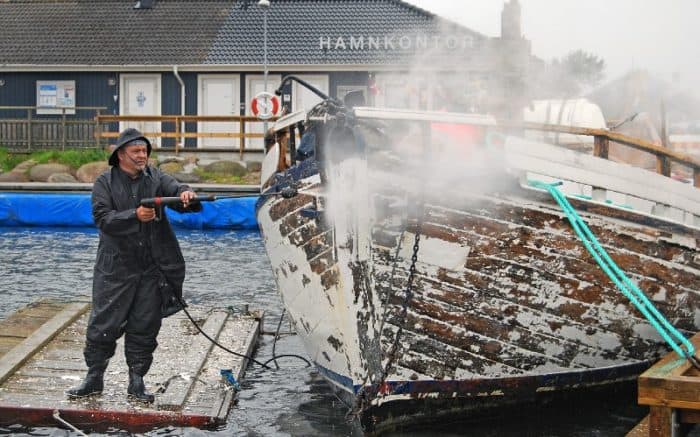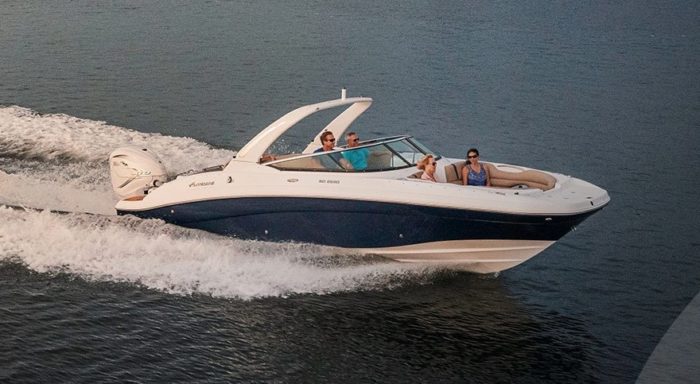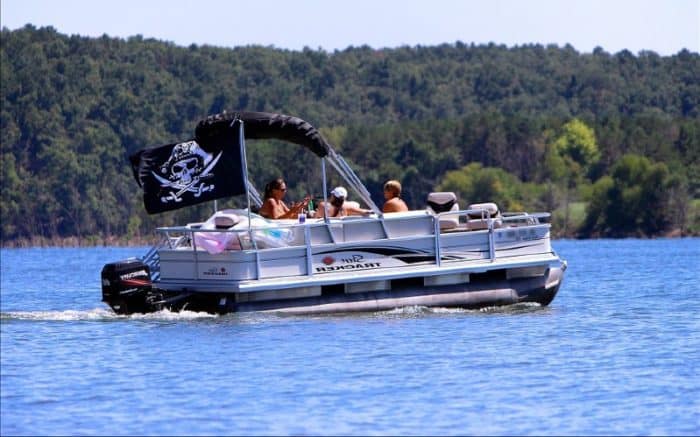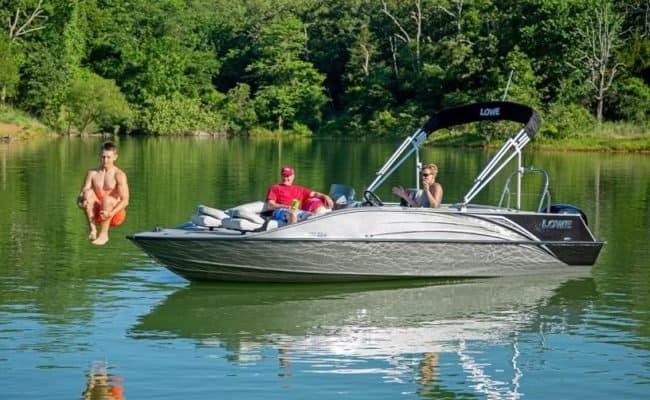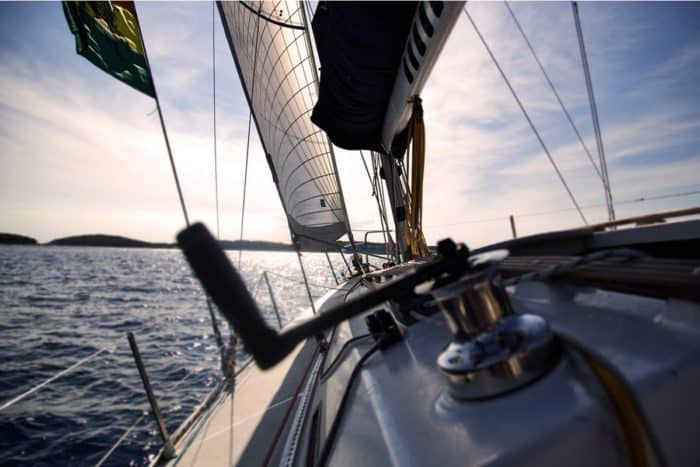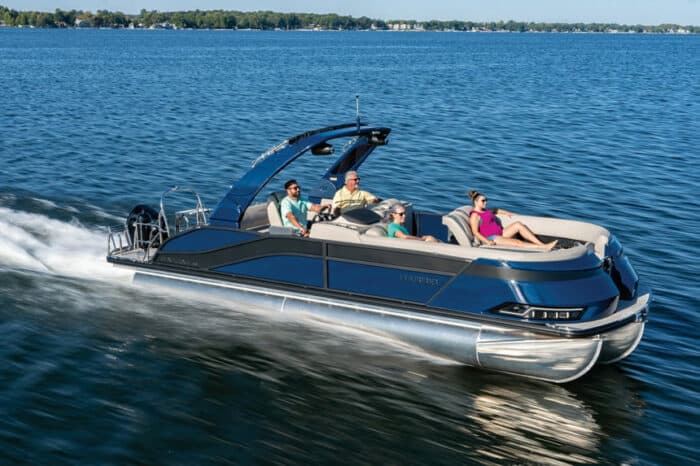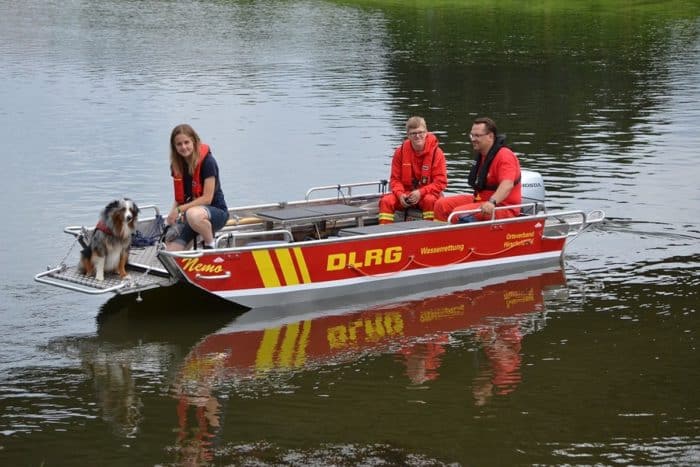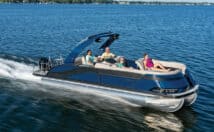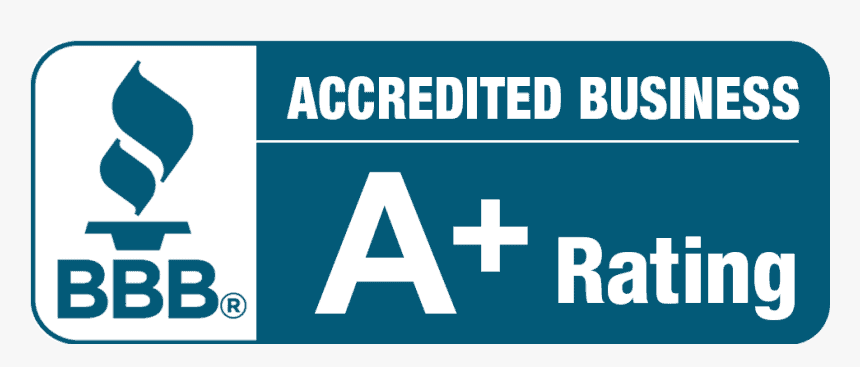Deck Boat vs Pontoon Boat: Key Differences and Similarities
When it comes to versatile boats that are ideal for family outings, fishing, cruising and more, you may find yourself eyeing both deck boats and pontoon boats. They offer a lot of the same benefits and features, but they’re definitely not the same thing. A pontoon boat is, first and foremost, a boat that uses aluminum or inflatable tubes (pontoons) to stay afloat. A deck boat is designed to have a large amount of deck space, but still has a hull similar to traditional boats. Let’s take a look at the other key differences and similarities between deck and pontoon boats
Differences Between Deck Boats and Pontoon Boats
There are several key areas I’ve identified in talking with some boaters that they are concerned with when it comes to the differences between a pontoon vs deck boat that include:
- Cost
- Speed
- Uses
- Maintenance
- Style & Design
- Stability & Function
- Ease of Use
Cost
How much is a pontoon boat or a deck boat?
Boat costs are rarely held to any hard and fast rules. There are yachts out there that cost billions. You can probably find a good secondhand jon boat for just a couple hundred dollars. So there’s a big range. But, if we’re looking at costs in general, I’d say you can probably find a pontoon boat cheaper than a deck boat of similar size and quality.
Pontoon Boats
A brand new 20 foot Bass Buggy pontoon boat might set you back a little under $25,000. Pontoon boats have gone up in value and some top of the line pontoon boats with high quality features may end up being as much or more than similarly outfitted deck boats. A 24 foot Party Barge pontoon boat with an 11-person capacity can set you back $52,000.
Deck Boats
A 21 foot Bayliner Element Deck Boat starts at around $35,000. The cost will significantly increase as the size of the boat goes up. The Starcraft SCX I/O 211 Surf can take a dozen people out for a day of wake surfing but will set you back around $75,000.
These are just a couple of examples, of course, and we’re looking at manufacturer process. The fact is that costs have changed a lot in recent years compared to 10 or 20 years ago. So, in general, a pontoon boat is cheaper and most deck boats typically cost a little more. But do your homework on this as prices can vary wildly based on:
- Manufacturer
- Length
- Features
- Condition
Speed
How fast do pontoon boats and deck boats go?
Neither a pontoon boat or a deck boat uses speed as a main selling point. That said, different models can still achieve the speeds you’ll want to accomplish most of the activities boaters enjoy on the water.
Pontoon Boats
The average speed of a pontoon boat is around 30 miles per hour. But keep in mind that this average is calculated across a wide range of boats. Some smaller leisure craft only have enough horsepower to hit 10 mph to 20 mph. That’s a pretty slow boat. But there are some high performance tritoon boats that can get up to 50 mph or more. In general I’d say pontoon boats aren’t built for speed, though.
Deck Boats
Finding a deck boat that can easily hit speeds of 70 mph is not hard at all. A deck boat can of course suffer the same fate as engines can have low horsepower and low output for them as well.
If speed is the name of the game for you, then a pontoon boat probably won’t be able to meet your needs. However, either vessel should be able to handle the speed needs of most boaters.
Uses
What are the primary uses of pontoon and deck boats?
This is always a big concern. People who buy a fishing boat have a pretty clear intention in mind for their boat, right? And if you buy something called a Party Barge it’s not hard to guess what that’s for, either. But a lot of us want versatility in a boat.
Pontoon Boats
Back in the day a pontoon boat had a lot less going for it than a deck boat in terms of activities. The power just wasn’t there. So while a pontoon boat has always been a solid option for things like leisure cruising or fishing, it did lack in the more intense parts of fun on the water, namely water sports. Nowadays it’s more than just a stable platform, it’s a versatile boat that offers a smooth ride for your passengers, your fishing gear, and lots more.
Pontoon boats today can and do have the horsepower to kick things up a notch. Your optimal speed for things like water skiing is usually around 25 mph and tubing is best done at a lower speed. Some smaller pontoon boats will not have the power to pull this off but most models are more than able to handle this. A pontoon boat motor putting out 150 horsepower should be more than capable of managing water skiing.
Now, are you entering an extreme sports competition being towed behind a pontoon boat? Probably not. There are tritoon boats out there, that is a pontoon boat with a third tube underneath, that put out serious horsepower and can get up to 40 mph and even 50 mph, however. They cost a lot more, don’t doubt it, but they have power. But for casual fun with the family, you can tube, wakeboard or ski just fine with a pontoon boat.
Pontoon boats are also great for leisurely cruising and less intense activities like fishing. Because of all the space on deck for both people and gear, these are ideal.
Deck Boats
You can get a deck boat that can give you more power for less money overall if your heart is really set on kicking up some wake so you can have some fun in the water. I would say, with a new boat and the way most people are interested in skiing or tubing, both boats offer great abilities but a deck boat may edge out the pontoon for intensity.
If you’re looking for a solid fishing and leisure boat, deck boats also excel in this regard. Pontoon boats generally have more room because of how the deck is laid out, and offer greater stability as well, but a deck boat is no slouch. There are few uses you can come up with for one kind that you can’t do with the other boat.
Maintenance
How much time, effort and money do you need to put into keeping your boat in good working order?
Maintenance is a place where I’d say you’re likely to notice one of the bigger differences between these two boats. Neither one represents any big or unique challenges to maintain, but there are clear differences.
Pontoon Boats
A pontoon boat is a lot easier to clean and maintain because the aluminum pontoons are very simple to deal with. The cleaning process is relatively fast and simple compared to fiberglass boats. But you do need to keep them clean. An unclean boat hull will slow both boats down but you’ll start to notice it a lot more with a pontoon boat. Let that growth go too long and it can start to feel like you’re dragging anchor the whole time.
Another bonus for pontoon boats is that, if there’s a more serious problem, you can just remove a pontoon. This can be done for repairs or replacement. If you have a spare you can literally get right back to boating. No such luck with a deck boat which will require far more in depth and costly repairs.
Deck Boats
Your deck boat, as with many other boats, has a fiberglass v style hull. It has a gel coat on it and that needs to be protected. Over time, growth of algae, barnacles, and just general pollutants can stain the coat and break it down. If you’ve ever had to clean a boat hull, especially one that was lacking in maintenance, you know what a chore this can be. Damages to a fiberglass hull will likely take more time and more money to fix than those in a pontoon.
Style and Design
Difference in boat design and construction?
This is a more important feature than some people realize at first. The technical aspects of a boat, the cost, and how you use it are all greatly important to be sure. But how it’s made and how it looks are big points simply because you want a boat that is well made and that you like the look of.
Pontoon Boats
Most pontoon boats are squared off at the front, or at least flatter. Some deck boats do have more of a rounded front than the traditional, sharp V point you’ll see on many vessels, but the shape is usually closer to what you might picture in your mind when you think of a boat.
Your major design difference is that the pontoon boat is set on pontoons. Instead of that V-hull you have two, or sometimes three, aluminum tubes that offer stability and buoyancy to the boat. Because of how the pontoons create buoyancy, the deck of a pontoon boat can offer maximum space for crew and gear.
Deck Boats
Deck boats have a decent amount of deck space, hence the name. The bow area allows for extra seating, just like a bowrider, but this is still a v-hull boat. Because of the shape and design of the hull there will be less space overall than a pontoon boat of the same length. That said, a deck boat also has the traditional lines of a boat that some people really like. It’s totally subjective in terms of what you like the look of, of course.
Modern boating being what it is, both kinds of boats can come with all manner of tricked out design features from lights to upholstery and carpeting. Pontoon boats had a much more utilitarian look back in the day. To be honest, a lot of them were pretty plain or ugly. But design innovations and effort has moved the bar so you can get a really slick looking design on either kind of boat.
Stability and Function
How well does the boat perform on the water?
This is one of the areas where pontoon boats and deck boats shine but display their differences. The reason a pontoon boat has pontoons really comes through when you compare the stability and function of one to a boat like a deck boat.
Pontoon Boats
A pontoon boat will likely not be as fast as a deck boat, but it’s also a lot better on fuel. The pontoons float on top of the water rather than having a hull cutting through it. So there’s less resistance against the whole boat. Because a pontoon boat rests on pontoons above the water, the deck is often far more stable. You’re still subject to the effects of waves and wind, but the entire boat doesn’t shift back and forth with the motion. A lot of people who suffer seasickness find pontoon boats to be more easy to deal with.
Pontoon boats handle a little clumsier in the water, especially if you’re using two pontoons instead of three. If you want to do a 180 turn, for instance, you’re cutting a pretty wide path to circle back. Three pontoons make it easier by giving superior stability and buoyancy. If you try sharp turns at speed in a pontoon boat, the momentum will cause everything and everyone on the deck to fly in the opposite direction, which of course you don’t want. So you need to handle turns with more caution in a pontoon boat than you would on a deck boat.
A pontoon boat can plane a lot more easily than a deck boat. This is true even when you have a pontoon boat loaded up with gear and passengers. That’s a spot you need to be wary of, however, as some pontoon boat owners forget their maximum capacity pretty easily. The downside to all that deck space is that sometimes you can forget how much you’re able to carry. If you’ve ever heard of a party boat sinking on a lake or a river, oftentimes it was a pontoon boat that took on too many people because there was room for a lot of people, but it couldn’t handle the weight of all of them.
Deck Boats
Because a deck boat has a v-hull, deck boats offer the ability to cut through the water really quickly and smoothly. That means when you hit those outboard motors, you’re going to get a deck boat moving fairly quickly. The acceleration is going to be far superior to that of a pontoon boat. It will also likely be able to maintain higher speeds as well. A trade off here comes in the form of stability. Everything on a V shaped hull rests on the point of the V, which means the boat can rock from side to side. If wind or rough seas hit, the boat is more likely to rock back and forth.
Ease of Use
How easy is it to get behind the wheel and get on the water?
Boats all function “more or less” the same, but that “more or less” is carrying a lot of weight. The difference between a bass boat and a yacht may be significant. Or a kayak and ski boat, for that matter. Deck boats and pontoon boats are not too different in terms of operation. The difference is felt more in the handling of them. Because of the different hull types, the way the boat feels and responds on the water is the biggest variance that takes some time to get used to.
Pontoon Boats
In general, driving either a pontoon boat or a deck boat is on the easier end of boating. The controls are fairly simple in terms of when and hot to throttle or trim the engine. Turning is probably the hardest thing to fully master with a pontoon boat but by no means is it hard to do, it’s just a different feel than what you may be used to with other boats.
Deck Boats
Deck boats operate in much the same way as any other boats. Nothing stands as as particularly unusual or specific in terms of operating one. If you’ve had no issue with other boats, a deck boat should be no trouble.
The Bottom Line
Pontoon boats are generally cheaper to buy but slower overall. They offer greater deck space and more stability on the water. Fuel efficiency can be superior in a pontoon boat, and maintenance is usually easier as well.
Deck boats handle like most other boats. They offer greater speed and are ideal for a wide array of activities. They tend to be more agile on the water, and offer a snappier ride overall.
Neither boat stands out as being “better” than the other by any significant metric so choosing between them definitely comes down to personal factors like your own budget, style preferences, and what you need to use them for. In the end, these are both solid boat styles, however, and you’re likely to enjoy your time using either.
Categories: Boats, Pontoon Boats

